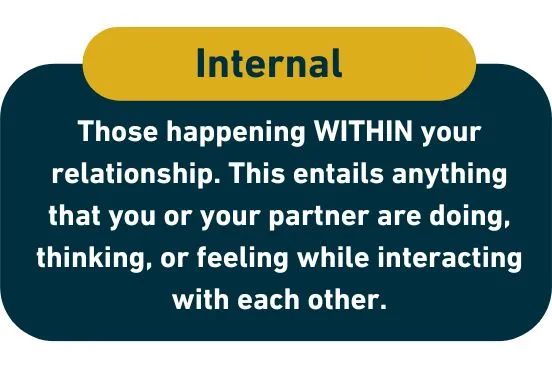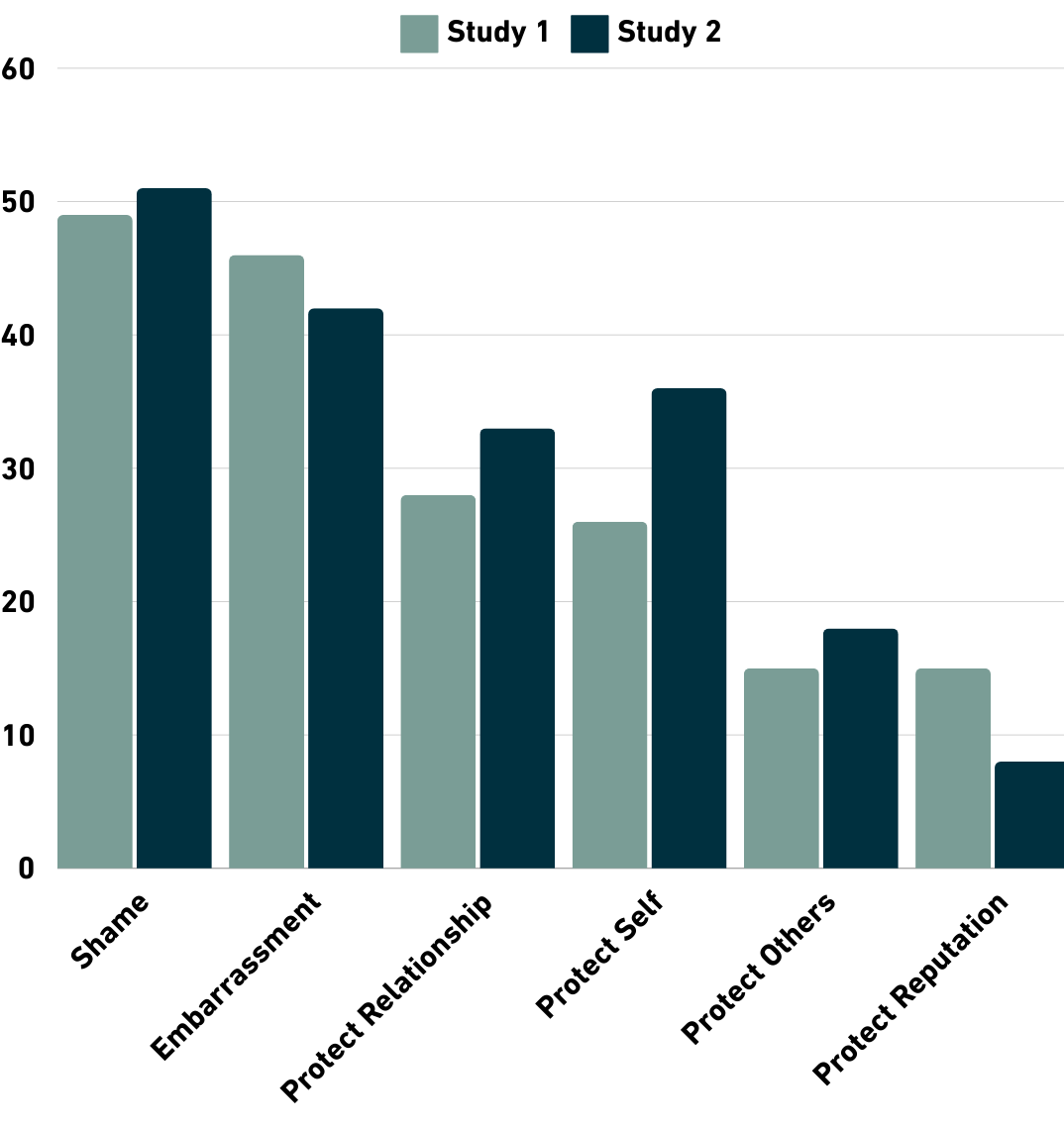This 10 item list contains the most critical warning signs that can spell trouble for your marriage or long-term relationship (LTR).
Once you understand these factors, you’ll get a clearer picture of how healthy your LTR or marriage may be at the moment, and your risk of separation or divorce.
First things first, here’s a way to organize these signs in your head.
We’ll call 8 of these signs “internal factors” and the last 2 “external factors.”
What do I mean by this?


This first sign is an internal warning sign.
Warning Sign 1: Overwhelmingly Negative Communication Patterns
All relationships have conflict at some point. This becomes a red flag when your patterns of communication are more negative than positive.
Lots of criticism and defensiveness are especially bad and will threaten how long your relationship lasts.

In fact, these two behaviors have been proven by top marital researchers as predictive signs of divorce. Yes, you read that correctly – predictive.
In one of the original research studies in this area, researchers Carrère and Gottman were able to predict the chances that a couple would later divorce by simply observing a marital conflict in action.
In fact, just the first three minutes of a relationship conversation had astonishingly high predictive power for revealing which couples would later divorce!
How to Course Correct
Focus on correcting your behavior and not your partner’s. Commit to doing YOUR part which may change the entire vibe in the relationship.

Pro tip: recognize when your negative communication patterns are happening in the moment!
And when they do, replace criticism with expressing your unmet needs. And replace defensiveness with willingness to admit your own mistakes or faults.
In this way you’re not only helping the relationship communication, but also leading by example for your partner as well.
Warning Sign 2: Stonewalling
Stonewalling is the habitual pattern of avoiding your partner or pulling away from them, aka withdrawal. You’re physically there but mentally checked out.
For example, you may tune out during important conversations, or ignore their attempts to talk or spend time with you.

This is another warning sign that’s been proven as a predictor of relationship dissolvement.
Stonewalling in Action
Imagine Janet and Tony, a married couple for five years. Janet tends to be emotionally expressive, while Tony withdraws during conflict.
One evening, Janet brings up a recurring issue about finances. Tony sighs, grabs his phone, and mutters about needing to check work-related texts.
Janet feels unheard and raises her voice, but Tony remains silent, his eyes glued to the screen. The conversation descends into a tense standoff, with Janet pleading and Tony stonewalling.

This is a classic illustration of stonewalling in a marriage.
One partner, overwhelmed by the emotional intensity, shuts down, while the other feels increasingly unheard and frustrated. Stonewalling creates a barrier to communication, hindering resolution and damaging intimacy.
How to Course Correct
Stonewalling often happens when one of you has learned to fear conflict, or gets too overwhelmed while it’s happening.
Change this pattern by catching it in the moment and excusing yourself for a break to cool down.
Take responsibility for your own reactivity and for needing a time-out.
Before or after your cool-down break, reassure your partner that you’ll revisit the issue later and you’re not just avoiding the issue.

During your cool-down break remember that deep breathing goes a long way! You may also want to try a distracting activity to take your mind off of the fight for a bit.
Warning Sign 3: Low Trust
This appears when your trust in your partner is very low or completely gone, or vice versa.
This can be trust about emotional and sexual fidelity but also other kinds like trust with parenting, financial management, health, and overall decision making.

How to Course Correct
If trust has been broken before acknowledge this out loud, offer genuine apologies, and make deliberate efforts to restore it.
Be humble and empathetic if you’ve caused emotional damage.
Don’t be afraid to ask for these things for yourself if your partner broke your trust.

Work together to agree on what actions can help rebuild trust. Don’t expect one action or one apology to fix things overnight.
Trust is earned over time with a commitment to rebuilding it and consistent actions.
Warning Sign 4: Unhealed Attachment Injuries
Within Attachment Theory, “attachment” is the emotional and psychological bond shared between people.
ALL humans form these bonds from birth – and even in utero – as a necessity of survival and thriving.

An “attachment injury” is when there is damage done to this bond via betrayal or abandonment.
All of us, from cradle to grave, are happiest when life is organized as a series of excursions, long or short, from the secure base provided by our attachment figure(s).
-Susan Johnson
How to Course Correct
If an attachment injury happened in your relationship but never healed properly, it’s a red flag for potential relationship failure!
Course correct by identifying and repairing such injuries. Whether they are 2 months or 20 years old, they MUST get proper care to heal and keep your bond strong.

Work on acknowledging the injury, rebuilding trust, and both earning and granting forgiveness.
Warning Sign 5: Negative Perception of Your Partner
This is when you feel mostly negative about your partner and their character. You may have even lost respect for your partner, or vice versa.

When there’s a negative overall perception of your partner, your fundamental view has changed and it shows in how you treat them.
Even worse, you may feel contempt for your partner.
Contempt within marriage is another proven warning sign of later divorce and the most destructive predictor of all!
Curious about the research on contempt? Learn more about it from the Gottman Institute.
How to Course Correct
Gratitude and appreciation are big ways to change negative perceptions of your partner.
And research has shown that practicing gratitude leads to more overall happiness.
Harvard Health outlines the real impact of gratitude on your levels of happiness.
Find reasons why you’re grateful for your partner and remind yourself of what initially brought you together.

Find things that you appreciate about your partner and make it a new habit to express it to them.
For example, “honey, I’m really grateful that you know how to stay calm and get us through crisis situations. I couldn’t have gotten through this past month without you.”
Expressing gratitude to your partner and acknowledging it to yourself will add positive fuel to the relationship which can be the catalyst for course correction.
Warning Sign 6: Keeping Secrets
This is an obvious warning sign for relationship failure but also one that’s harder to spot since secrets by their very nature are unknown.
However, gut feelings are often powerful signals designed to warn us of danger.
If your gut is nudging at you, pay attention! It may be correctly alerting you.
If you’re the one keeping secrets in your relationship, understand that this may indicate a relationship in poor health.

Also, consider that there may be huge consequences to keeping secrets including ones that aren’t so obvious right now.
In two paired studies about secret-keeping, researchers found that poor quality relationships tended to have more secrets between partners and that secret-keeping was a symptom of emotionally distant relationships.
In this way secret-keeping was found to be less a cause of low relationship quality but rather a symptom.
These same studies found the following as the most common reasons people keep secrets from their partners:

How to Course Correct
Quiet self-reflection can be a powerful tool. If you’re keeping secrets, ask yourself:
- Why?
- What are you risking by continuing to hide or lie?
- What might you gain by coming clean?
If you’re struggling with your own secrecy, seek help from someone you deeply trust or from a professional bound by confidentiality.
If you suspect your partner is keeping secrets, don’t make assumptions if there’s no evidence.
- Approach it with them in a direct but non-attacking way.
- Express your concern and worry, then ask questions.
- Seek professional help as a couple, if needed.
Warning Sign 7: Loss of Future Vision
This warning sign is when you stop envisioning a future together or even stop planning future events.
This is an especially dangerous sign if you start envisioning your future alone, or with a new person.

How to Course Correct
Consider building new memories with your partner and setting joint goals.
If you don’t feel motivated to make future plans or create new goals, what’s underneath your hesitation? Knowing this allows you to attack the core issue.
If you’re envisioning a future with someone new instead of your current partner, understand that this is often built on fantasy and skewed overly positive.
We tend to imagine the unknown with a new person through rose colored glasses.

It’s a distraction from your current problems and won’t help solve anything in the present.
Warning Sign 8: Drug or Alcohol Abuse
If you or your partner are abusing substances, this can pose serious risk to the health of your relationship and to its future.

Substance abuse may be a coping mechanism and a REACTION TO the negative energy of your relationship. But the reverse is true as well; drug and alcohol abuse also ADDS TO the negative energy of the relationship.
Put together, this creates a negative feedback loop:
The worse the relationship gets, the more substance abuse happens, and vice versa.
How to Course Correct
Seek help for your or your partner’s substance abuse issues and don’t delay! Your relationship will be better off for it.

In some cases, self-help may be enough to manage substance abuse like with mild problematic drinking behaviors. In other cases, more intense help is needed.
Be honest with yourself and your partner about the impact of substance abuse on your relationship.
It’s likely that trust has been broken so you’ll need to work on rebuilding this together. It’s not enough to just treat the substance abuse.
Now for the two external warning signs…
Warning Sign 9: Negative Perception by Family/Friends
This warning sign happens when your family and/or friends no longer like your partner, or worse, never did.
While there are times when their perceptions may be unfairly negative, there are other times when they may notice aspects of your partner that are blind spots for you.
This is an especially important sign when you’re close to certain family and friends, and you’ve historically trusted their opinions.

One study shows that for females, perceiving that her social network supports her relationship increased the stability of it.
How to Course Correct
If you trust the opinions of your family and friends, try listening to their concerns without defensiveness.
- Is there something you can learn from their perceptions that may help improve your relationship?
- Is there something you can learn from their perceptions that can help you decide if your relationship is not a healthy one for you?
- Are their negative perceptions based on misinformation that can be clarified?

Decide how much weight to put on the opinions of your family and friends, and how important it is to you (if at all) that they like your partner.
Depending on factors like closeness to your family and friends, cultural expectations, and your individual values, letting their opinions influence your relationship decisions may or may not fit for your situation.
Warning Sign 10: Life Crises
If your relationship has been hit by overwhelming stress or a crisis situation like a major health diagnosis, a financial crisis, a miscarriage, or the death of a loved one, these are largely out of your control.
Feeling sadness, grief, overwhelm, and hopelessness are all normal responses to crisis.

However, if these responses are causing major conflict between you and your partner this is a warning sign.
Sadly, some relationships completely fall apart under the weight of such trauma.
How To Course Correct
Accept the fact that EVERYONE responds to crisis differently! Do away with any false beliefs about the “correct” ways to respond.
Talk deeply about your feelings together. Keep the communications line open and free of judgement.
Show yourself and your partner grace, empathy, and compassion. If you treat your partner poorly, come back and apologize.
Recognize that a life crisis can either make or break you.
Team up to support each other and take turns leaning on one another.

Unsure how to show empathy?
Check out this 3 min cartoon short from Brené Brown:
Watch
Love doesn’t just sit there, like a stone, it has to be made, like bread; re-made all the time, made new.
-Ursula K. Le Guin


